With one week to go before the legislative elections, L’Orient-Le Jour takes the pulse of the country through immersive reports from the four corners of Lebanon. Six journalists and three photographers spent time with the inhabitants of different regions to understand how the economic crisis has affected them, and to see how the thawra has affected their mentalities — or not. In eight reports, we will tell the story of Lebanon in Lebanon. Today, in the third episode, we visit Mazraa, a district of Beirut where several Lebanons meet. Sunnis, Greek Orthodox and Shiites often share the same sorrows, but not always the same fears.
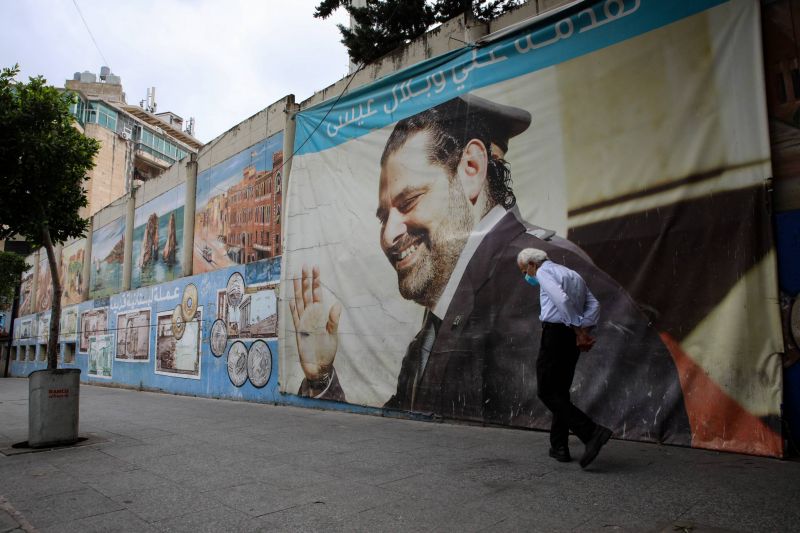
The political withdrawal of Saad Hariri has plunged some 98,000 voters in Mazraa into uncertainty about the next legislative elections.
Sitting on a plastic chair in front of an atayef (pastry) shop in Mazraa, Mohammad has just opened his blue eyes. Out of his pocket, he takes his notes about the electoral lists that are running in the Beirut II constituency, 10 in all, as if it were a soccer team’s ranking for the upcoming games.
Several candidates could please him. Any ‘ibn (son of) Beirut’ or those “offering services, because that’s all the people need.”
However, he will not vote. The withdrawal of his zaim, former Prime Minister Tammam Salam, has been convincing enough for him to abstain. He is far from being the only one. Never before has such ambiguity prevailed on the way this neighborhood of 98,000 registered voters approached the elections.
In this neighborhood in Beirut several Lebanons meet. Sunnis, Greek Orthodox and Shiites, whose number increased after the war, often share the same sufferings, but not always the same fears.
It is despair that holds the reins. All are convinced that nothing will change. They are all angry at the political class. But as soon as you scratch the surface, the “Kellon yaani kellon” (all of them means all of them) slogan of the October 2019 uprising gives way to deep-rooted allegiances, or at least, to strong political preferences.
In this neighborhood, a few weeks before the May parliamentary elections, the rise of the Shiite community and the withdrawal of Saad Hariri from politics are on everyone’s mind.
In every street corner, the flags of the traditional parties are waving in the wind. At first glance, one could say that each party has a base in this neighborhood.
In Basta al-Fawqa, Burj Abi Haidar, in the perpendicular streets of Barbour that lead to Ras al-Nabeh, the Amal Movement’s colors impose themselves on the landscape.
The flag of Ahbash, a pro-Syrian Sunni party, is flying everywhere, mainly in Babour and Noueiri.
Electoral billboards of outgoing MP Fouad Makhzoumi are scattered across the area, except in Tariq al-Jadideh, Hariri’s stronghold. Despite his withdrawal, his photos are still hung.
Hariri’s orphans
The four walls of Mohammad Sammak’s office, a mokhtar (local official) in Tariq al-Jadideh, evoke a nostalgia for a bygone era. Rafik Hariri’s photos are everywhere. “One hundred percent Hariri,” Sammak said.
On his desk, there are stamps that he now buys on the black market. “Everything is [paid for] from our pockets now and we can’t raise the prices too much,” said this father of two daughters, who have US citizenship.
One of them is in the US. The other is finishing her studies at LAU before she joins her sister. A separation forced by the crisis that has plagued Lebanon for more than two years.
Like many voters of the Future Movement, he chose to abstain. “Even if we have 120 MPs, we can’t change anything. There is a pen facing the weapons on the table,” he said, in reference to Hezbollah.
Next to his desk, a map of Tariq al-Jadideh. “Ana ibn el manta’a [I grew up in the neighborhood],” he proudly said. A corner, “that has maintained its Sunni and political identity, unlike the rest of Beirut.”
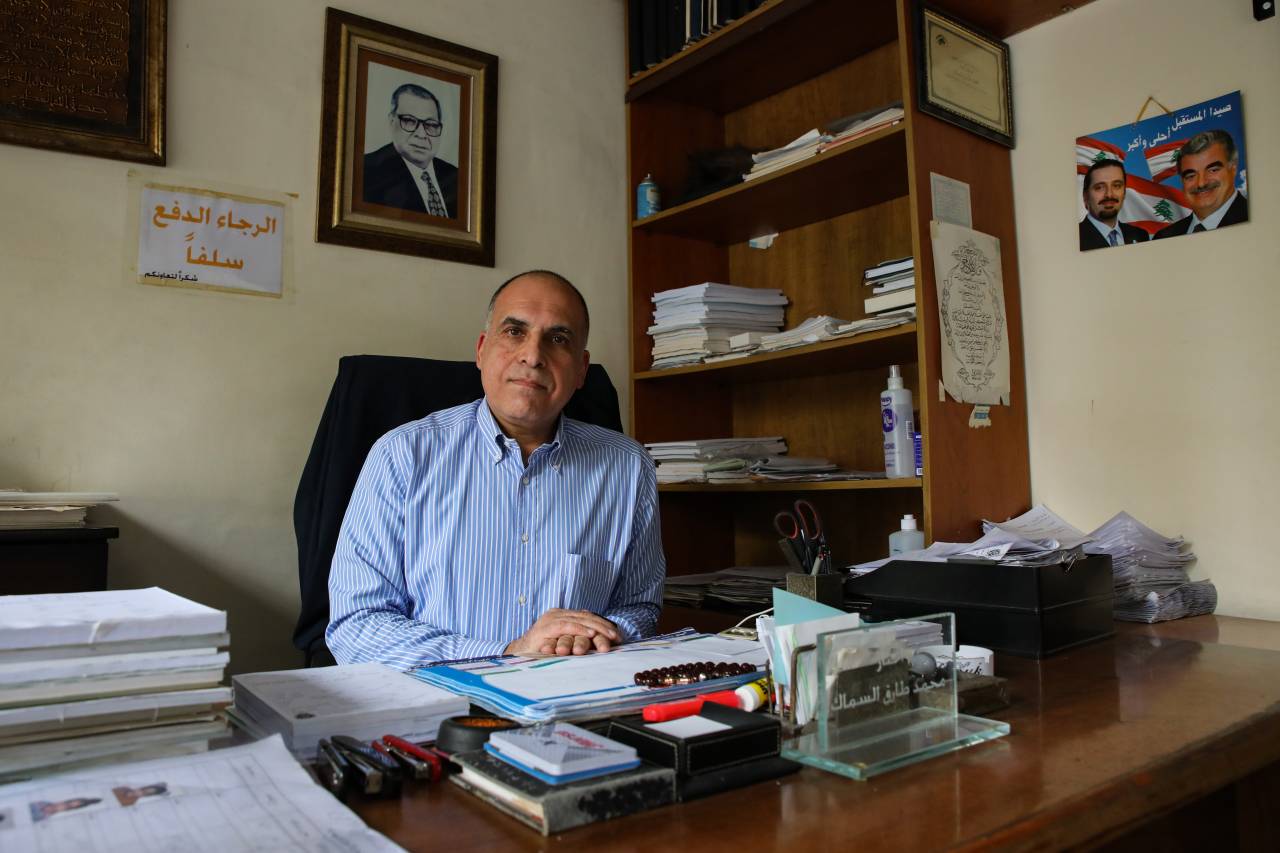 Mohammad Sammak, mukhtar to Tarik Jdide, does not intend to vote. “We have only a pen to oppose to weapons”, says this partisan of the current of the Future.
Mohammad Sammak, mukhtar to Tarik Jdide, does not intend to vote. “We have only a pen to oppose to weapons”, says this partisan of the current of the Future.
“Maalem Mounir.” That’s how he is known in Tariq al-Jadideh. This bodybuilder began working at the age of 10, in Tariq al-Jadideh, near Malaab al-Baladi, where he grew up.
It is here that he made a name for himself. “I am a true Beiruti. I’ve seen everything,” said this former weightlifting champion. The youngsters at the weight-lifting room, where he goes often, envy him. “Their jealousy is going to jinx me one day.”
“Ya mahla el harb [The civil war was easier to live in]. What we’re going through now is much worse,” he said.
“Back then, there was a lot of money out there. If someone’s car got damaged by a shell, he would fix it the next day. Now I do small repairs for LL10,000.”
In his modest workshop, plunged in darkness due to power cuts, his tools are put away. It’s been two weeks since any customer came through the door.
On Oct. 17, 2019, he took to the street in Beirut in protest against the political class. But today, the thawra (revolution) candidates do not convince him. “They can’t even get along, and they want me to trust them,” he said, in reference to the disunification of the opposition lists in the May elections.
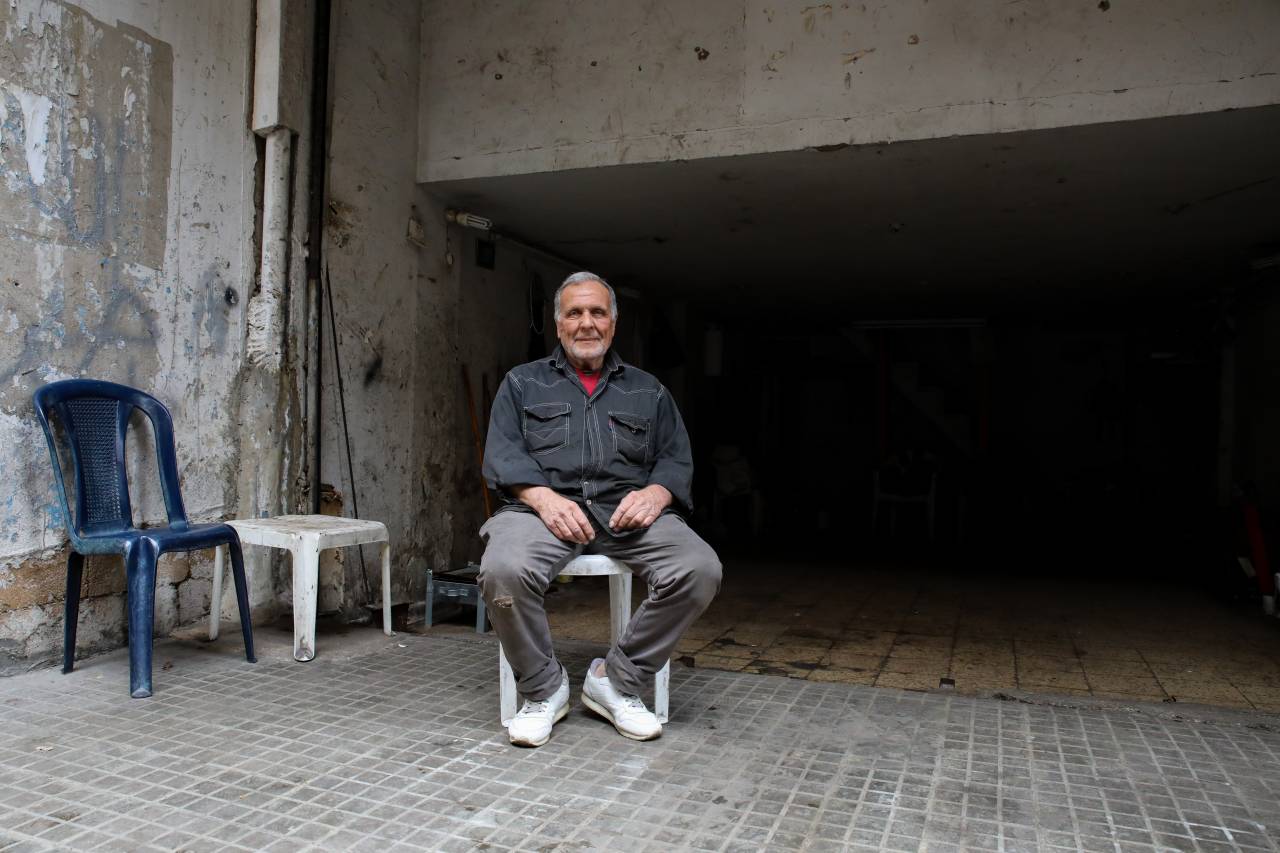 “Saad will come back, right? He must have a plan, ”says Maalem Mounir, a former sympathizer with the Future movement.
“Saad will come back, right? He must have a plan, ”says Maalem Mounir, a former sympathizer with the Future movement.
In 2018, he and his family rushed to the polling station at the last minute, thinking that the March 8 camp (Hezbollah, Amal, Ahbash) could win the elections.
“I voted for Saad Hariri reluctantly. I did it for his father.” In the end, it was the Future Movement’s list that amassed the most seats.
Mounir still does not understand Hariri’s decision to withdraw from politics. A decision that reshuffled all cards in this constituency.
“Saad will come back, right? He must have a plan,” he said. For even if he said he is not sectarian and cites the example of Rafik Hariri who “helped everyone without exception,” the possibility that his constituency’ political color changes scares him.
“The Sunnis are lost. Everything must be done to prevent Hezbollah from winning this year,” said the Maalem, although he does not believe that the elections will actually take place.
‘We already have our own Taliban’
The sound of bells resounds in Barbour. The church, located at the heart of the neighborhood, is surrounded by all kinds of businesses. It recalls the historical presence of the Greek Orthodox, albeit a minority presence, in this land.
Some of them fled during the Civil War. Others stayed, like Michel Saliba. “We are loved here,” the manager of Ahwat Saliba said.
“If you did not pass by here, it means that you have never been to Mazraa,” said Assad Saliba, the co-manager, in his 50s.
Smoke from tobacco products fills the cafe. In the cloud of smoke, there are many wrinkled faces. Ahwat Saliba is the old-timers’ favorite corner. Sitting around a round table with a cigar, a cigarette or with the tip of the hookah between the lips, they play cards, trying, unsuccessfully, not to get too excited.
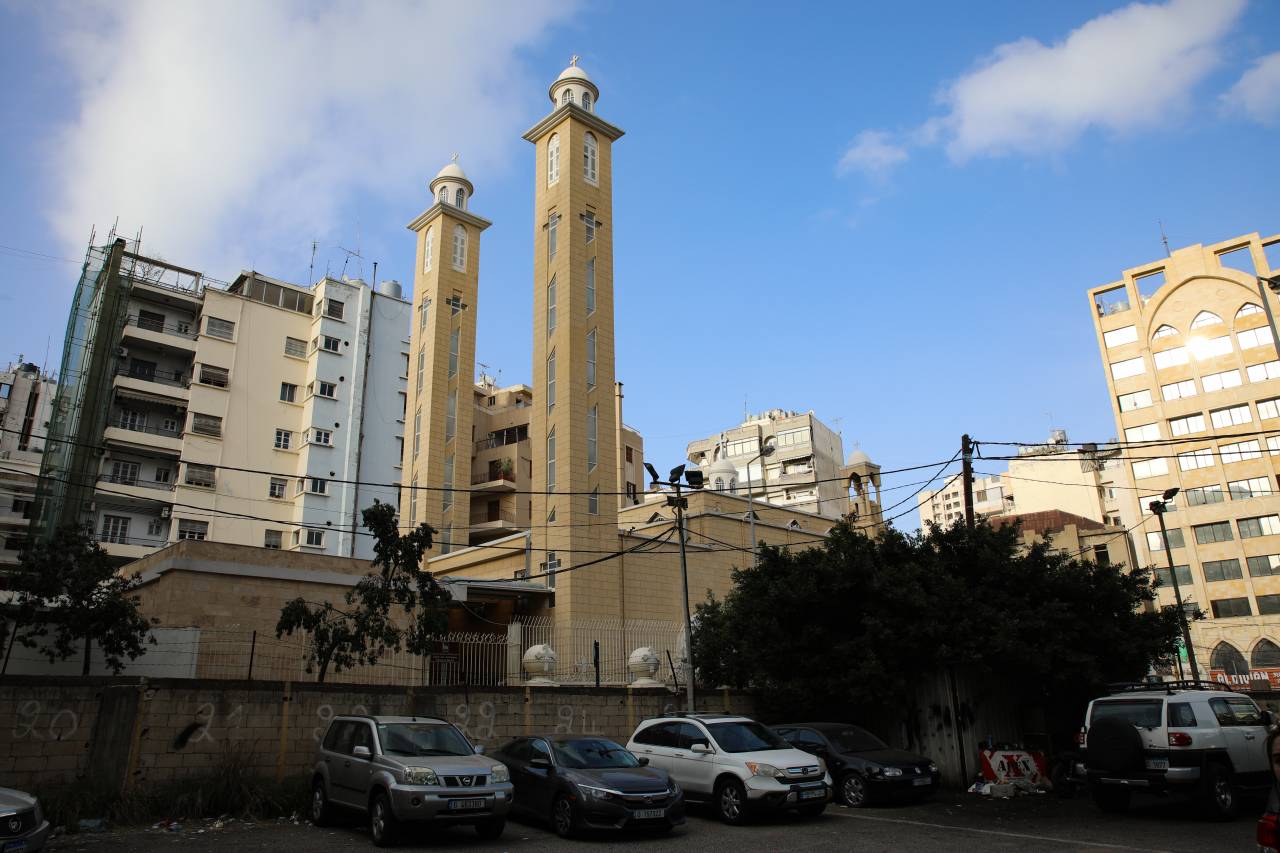 The Greek-Orthodox church, planted in the middle of Mazraa, recalls the historical presence of the Christian minority in this district.
The Greek-Orthodox church, planted in the middle of Mazraa, recalls the historical presence of the Christian minority in this district.
In this cafe that opened more than 70 years ago, nostalgia for the old Beirut prevails. Photos of the city before the war are scattered on the walls, along with a photo of the institution’s founder.
“We all used to know each other here. There were gardens, old buildings, water and electricity around the clock. Now everything is difficult with the crisis, but luckily, I still have a job,” recalled Michel, a 69-year-old accountant.
“The demography has changed here. Before, there was a Sunni majority and we were a Greek Orthodox Christian minority. Now there are the Shiites and Sunnis, and then the Christians,” Assaad said.
He has never missed an election. He usually votes for the Greek Orthodox candidate of the Future Movement. But Hariri’s withdrawal has been a “shock” to him.
In the cafe, Khalid*, a 40 year old, starts to sing. “Tell him to shut up, we can’t hear each other anymore,” Michel told Assaad.
The conversations about the upcoming elections are still in full swing. “Hariri withdrew, he told us to stop, so I’m following the guidelines,” Khalid said. “He joined politics with his money and he is the only one who left it poor.”
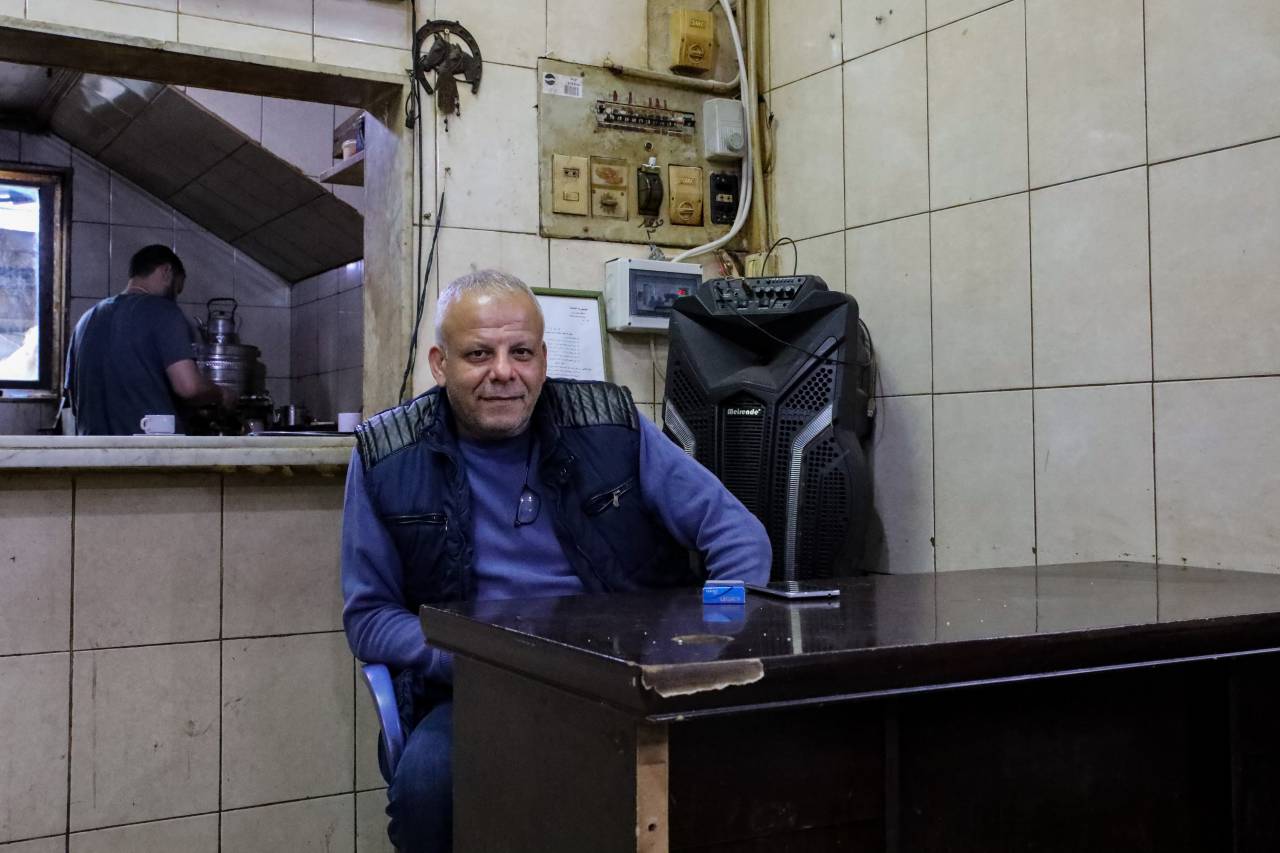 “We have our own Taliban,” says Assaad Saliba, co-manager of Ahwat Saliba, an institution in Mazraa.
“We have our own Taliban,” says Assaad Saliba, co-manager of Ahwat Saliba, an institution in Mazraa.
For these elections, the Saliba family intends to vote for Fouad Makhzoumi’s list, which includes Zeina Majdalani, who hails from a large Greek Orthodox family in Mazraa. “She is one of our relatives, so we will vote for her,” said Michel.
But Assaad does not believe in change. “The decision is not in the hands of the MPs. We know who is in charge of this country. We will end up like Afghanistan. We already have our own Taliban. ”
‘Hezbollah has eaten us’
Corniche el-Mazraa looks like Ali Baba’s caves. The delivery boys on scooters stop for a moment to pray in the Gamal Abdel Nasser Mosque. On the side of the intersection, a beggar carries a toddler, skin and bones, like a bag. Nothing wakes him up. Not even the urban fanfare of honking horns, the squealing tires and roaring engines. Sometimes it’s the sound of bullets that resounds.
“I’m not sectarian, but they force you to be,” Dina, 25, who lives next door said. She is referring to the Shiites, with no exception. She is no longer able to tell the difference. Here, May 7, 2008 — when Hezbollah and its allies took over several neighborhoods in Beirut by force — has left its mark.
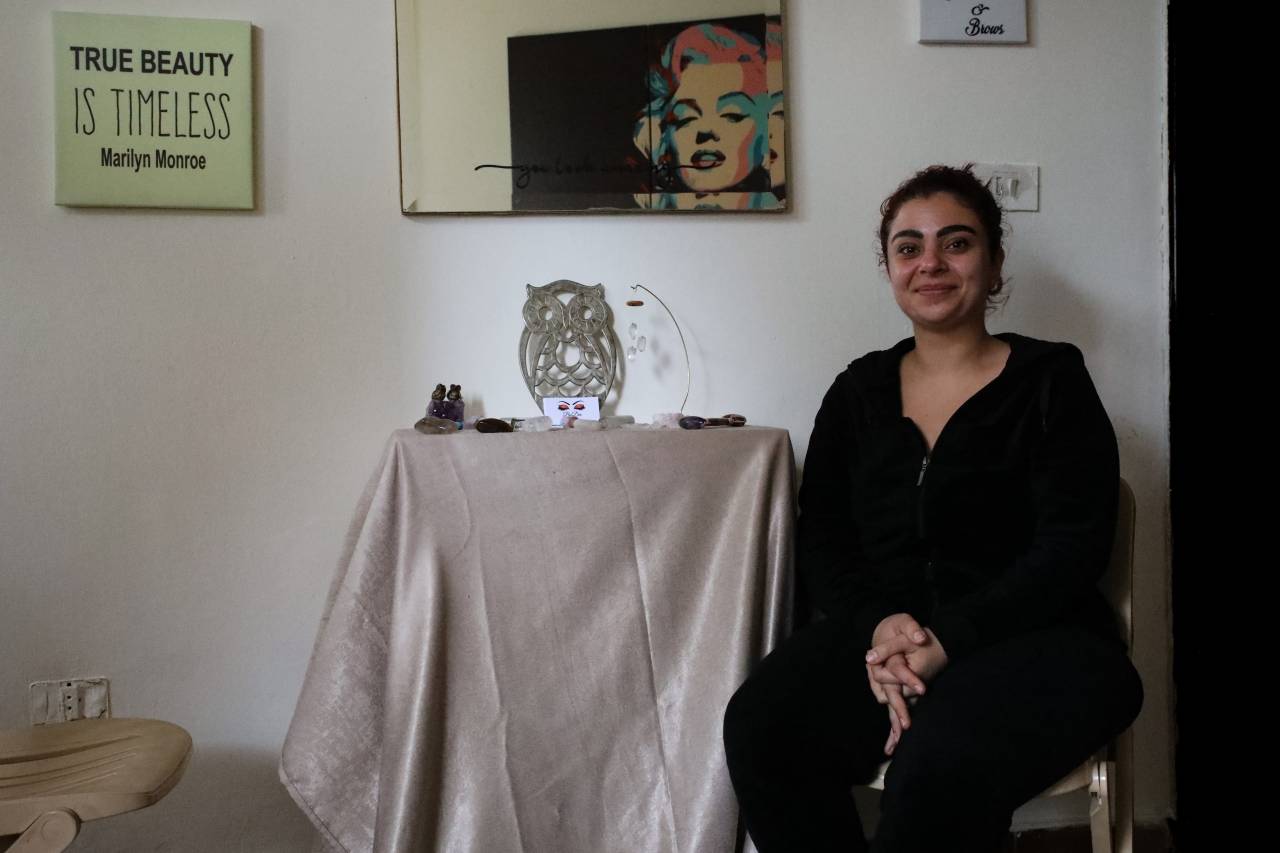 “I’m not sectarian, but they force you to be,” says Dina, who does not intend to vote.
“I’m not sectarian, but they force you to be,” says Dina, who does not intend to vote.
During the thawra, “they came here, broke everything and shot everywhere,” said the young woman, who witnessed the scene from her window. Since that day, her four-year-old daughter has been having panic attacks and screaming when she sees her mother at the window.
Due to health complications, her daughter had to undergo three operations. Dina has to ask her relatives to bring her the necessary medication from abroad.
“I wonder how much longer we can still hold out,” she said before bursting into tears. “I’m 25 years old, and I’ve been on antidepressants since the beginning of the crisis.” Dina feels that her neighborhood has been snatched away from Beiruti families.
“Hezbollah has eaten us, it has armed everyone,” It is not only Hezbollah that she has in her sights. The Palestinians and Syrians too. “All the Lebanese are going to be kicked out. They are the ones who are going to take the country.”
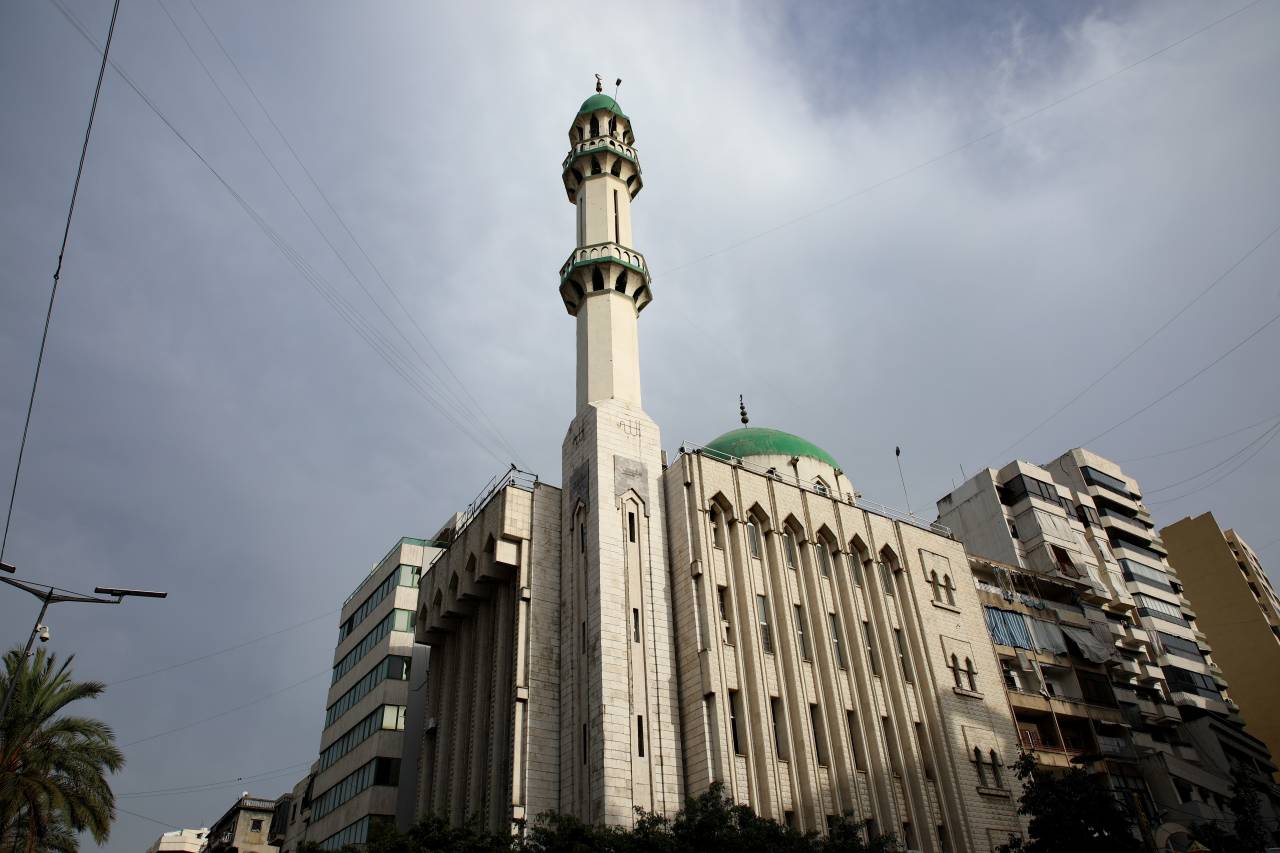 The Jamal Abdel Nasser mosque at Corniche al-Mazraa.
The Jamal Abdel Nasser mosque at Corniche al-Mazraa.
‘Here, Amal controls the street’
In the windows of a series of stores, gold jewelry is on display. In souk el dahab (gold), the few customers who still venture into these shops, once crowded, haggle over prices. Others want to sell their jewelry.
Passers-by slalom between the cars stuck in traffic. With his superhero balloons, Abed, 11, does not go unnoticed. This young Syrian works on the street. “The people are not very nice…” he said. He doesn’t have time to finish his sentence.
Fadi* interrupts the conversation to launch into a tirade against Syrian refugees. “He lives better than I do,” he said. In his hand, the latest mobile phone. As for Abed, he wears only a simple sweater to protect himself from the violent wind.
He lowers his eyes and looks down at his toes sticking out of his sandals. The contour of his lips, which he bites, is completely dry.
The forty-year-old doesn’t even glance at him as he continues his tirade. “They give birth to 10 children and throw two or three of them into the street to die.”
Everything goes into it: the Syrians who live better than the Lebanese, who steal the jobs of the population, and who now outnumber the people… “In two years, they will create a party, take up arms and make a coup d’état, believe me.”
Abed still doesn’t dare to say a word. Fadi was also “thrown” into the street by his parents at the age of 12. “I worked in the buses in Ain el-Mreisseh. I am a self-made man.” Today, he owns a jewelry store. With no employees? He smiles, embarrassed, like a child who has been caught red-handed.
“I have a Syrian employee. For $100 a week, he does everything I want. I could employ a Lebanese but they do not want to work.” he continues his monologue.
This time, it’s the country and the Lebanese who get the blame.“If a war breaks out between Lebanon and Israel, I’ll be with Israel,” said this father of three. This hatred is fueled by the feeling of losing his country which he perceives to be “in the hands of these warlords and zaims.”
For him, Saad Hariri and the Mufti are “no better than the sole of his shoes.” While he dares to insult them, he immediately lowers his voice when talking about Amal and Hezbollah. “Here, Amal controls the street. You need to go through them, even to get power from the neighborhood’s generator.”
‘The Sunnis are to blame’
The flags of Nabih Berri’s party drip onto the lampposts of Ras el-Nabeh. These “ornaments” do not even spare the trees. Amira*, who lives in the area, doesn’t like to call them the “Shiite tandem.” “I am pro-resistance,” said the woman, who participated in the March 8 demonstrations, and who does not perceive with great interest the October 2019 uprising.
“It was nothing,” said this former employee of the Ministry of Telecommunications. But, since the beginning of the crisis that has translated into her retirement being stuck in the banks, she has been “disgusted” by this political class and its game. With one exception: Hassan Nasrallah. She adores him. “His ideology and his logic too.”
From the balcony of Amira’s apartment, “three generations grew up seeing the bombings and conflicts that have shaken the capital,” she said, while sitting in her living room.
For her, May 7 was the Sunnis’ fault. “I saw them from my window, they started it. Anyway, they touched the nerve of the resistance,” she said, in reference to the Fouad Siniora cabinet’s decision, supported by Druze leader Walid Jumblatt, to dismantle Hezbollah’s parallel telecommunications system.
“It is the resistance that allowed us to live in our country and survive,” said this woman, who votes in the Beirut II constituency, although she hails from the South.
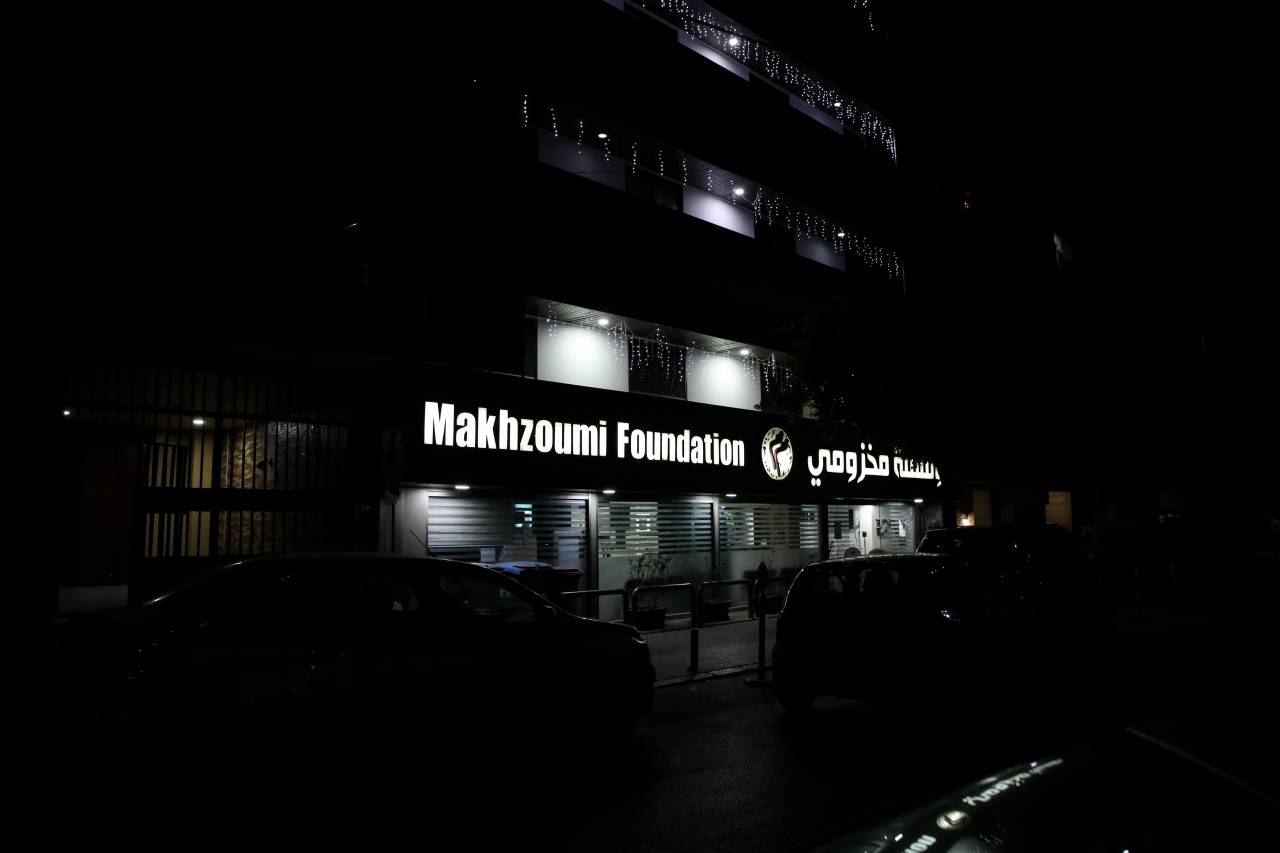 Clientelism is raging in Mazraa on the eve of the legislative elections.
Clientelism is raging in Mazraa on the eve of the legislative elections.
Someone knocks on the door. Her neighbor informs her that the Makhzoumi Foundation is distributing LL750,000 worth of vouchers. “They called me too, but I told them I wasn’t going to vote.”
Although she is not interested in the elections, she made a forecast. “It is true that the Shiites were a minority in the neighborhood, but they are imposing themselves now.”
For her, in the Beirut II constituency, it is Hezbollah’s turn to win the battle. In any case, whether he loses or wins, “Hassan Nasrallah will never give up his arms.”
‘The thawra, an American scheme’
All Walid* wants is a plan for Lebanon’s rescue. “I want a clear program. Today, we feel like the candidates don’t live here. There’s nothing about our standard of living. All we hear are slogans without substance and two discourses: with or against the weapons,” of Hezbollah, said this 78-year-old man in his apartment in Burj Abi Haidar.
His wife, Zahra*, is by his side with her walking stick. She is Sunni. He is Shiite. “We got married for love.” That’s the only time she smiled. Zahra has a heavy look in her eyes. Although the elections are approaching, no candidate has knocked on their door.
Not only has her life changed, but that of her daughter, a teacher, too. The latter had to move in with her parents, along with her child and her husband.
“She helps us with a monthly salary of LL2 million,” said her mother. The medication bill of these parents exceeds LL2 million. Sometimes, it is their son who sends them money. Other times, they find themselves forced to reach out to NGOs.
“Previously, we were the ones helping those in need,” said Ahmad.
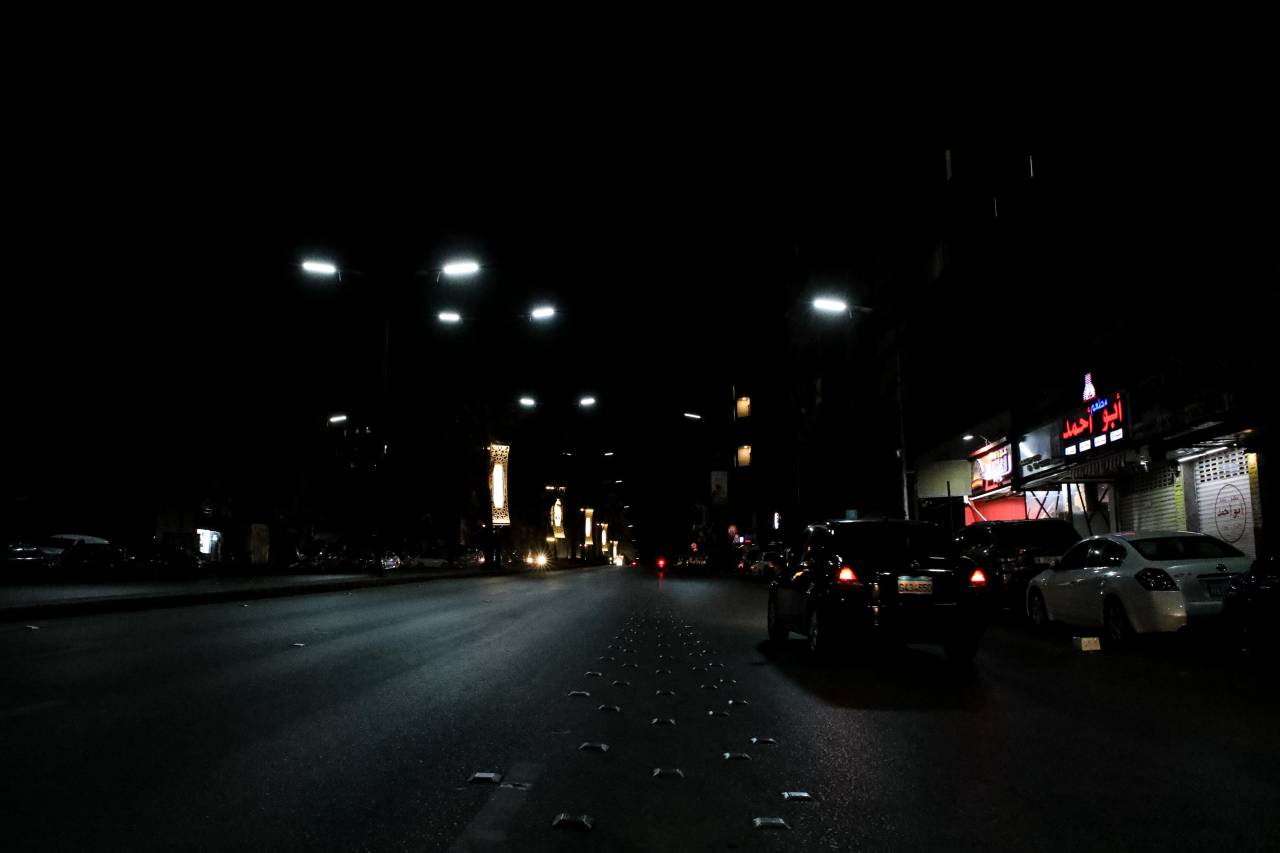 Corniche el-Mazraa is the arena of conflict between supporters of the Future movement and Hezbollah and Amal.
Corniche el-Mazraa is the arena of conflict between supporters of the Future movement and Hezbollah and Amal.
These retired teachers say they are neither with the March 8 nor March 14 camps, but one can tell they are a bit of both when listening to them. They are against the thawra “because it was an American plan,” Zahra said. They are “with the resistance against Israel,” because “one is forced to be when one has lived what I have lived,” explained Walid, originally from the South, who votes in the Beirut II constituency.
Both had cast their ballots for Rafik and Saad Hariri in the past. “We thought that Rafik had a project but the results were not up to the expectations,” said Walid, who added that two of his children were granted a scholarship from Rafik Hariri to study at the AUB.
Today, Walid does not close the door entirely to the elections “We’ll see on election day.” But if no one has a program, his vote will go to Hezbollah.
Mortgages rates drop below 5% for first time in three months
Homebuyers are getting some relief. The average rate on a 30-year fixed rate mortgage nationally is below 5% for the first time since April. The average rate on a 30-year fixed mortgage was 4.99% Thursday, down from 5.3% a week ago, according to Freddie Mac, a...
UN chief Guterres slams oil and gas firms’ ‘grotesque greed’
UN Secretary General Antonio Guterres has called for oil and gas companies to face special taxes. His comments come as surging energy prices sparked by the war in Ukraine push industry profits to new highs. Mr Guterres said it was "immoral" for firms to be profiting...
Mena region start-ups raised $105m in July
Start-ups in the Mena region raised $105 million from 44 deals in July, the lowest amount of monthly funding so far this year as global macroeconomic trends dampened investor sentiment, according to venture capital platform Wamda. The investment value of the deals...
Ponzi scheme run by Lebanese politicians caused economic pain to people, World Bank says
A "Ponzi Finance" scheme run by Lebanon's political elite to systematically capture the country’s resources has caused unprecedented social and economic pain to the Lebanese people, the World Bank said. The country's government "consistently and acutely" departed from...
Lebanon marks second anniversary of deadly Beirut port blast
Lebanon on Thursday marks two years since the explosion at Beirut's port that killed more than 215 people, injured thousands and destroyed large parts of the capital. Families of the victims plan to hold marches in Beirut on Thursday afternoon, as they continue their...
Wind farm controversy in rural Ohio: Crawford County voters will likely decide if wind turbine plans can proceed
When the Ohio legislature passed Senate Bill 52 last summer it gave local authorities the ability to quash proposed wind farms rather than leave their fate to the Ohio Power Siting Board. The Crawford County commissioners took advantage of that law in May when they...
Deals on computers and calculators for back to school shopping
The cost of school supplies has also been subject to inflation but with August comes special back-to-school sales. We’ve done comparison shopping below on brands, models and retailers for computers and calculators. Many times schools specify a model, for example the...
COVID-19 Vaccine Sales Push Moderna Past Expectations in Q2
The company said that its Spikevax vaccine brought in $4.53 billion during the quarter. Analysts were looking for around $3.6 billion, according to FactSet. Moderna shares surged Wednesday after the company also announced another $3 billion share buyback plan. ...
Oil output to see small hike to ease energy prices
The world's biggest oil producers have agreed to raise production slightly in a bid help ease high prices. Members of oil producers' group Opec+ - which includes Russia - agreed on Wednesday to add 100,000 more barrels per day to the market from September. The latest...
Pain volume control: a link between chronic pain and opioid abuse in the brain – OSU, UM research suggests
Patients with fibromyalgia and those prone to opioid addiction may have something in common, researchers say: the part of the brain that controls the body’s perception of pain has the volume cranked too high. Daniel Clauw, a pain researcher at the University of...
Arizona Primary: Rusty Bowers, who defied Trump, loses re-election bid
A Republican who testified against Donald Trump at the 6 January committee has lost an election to a candidate endorsed by the former president. Rusty Bowers aimed to be a Republican candidate in the Arizona state senate election, but lost the party's primary vote to...
Pelosi leaves Taipei to sound of Chinese fury
US Speaker Nancy Pelosi has left Taiwan after a brief but controversial visit. Ms Pelosi - the most senior US politician to visit in 25 years - departed on Wednesday after meeting leaders in the capital Taipei. But her visit, as part of a wider Asian tour, sparked...
Beirut blast: lack of justice compounds grief for families of victims
Almost two years ago, Mireille Khoury was at her home in Beirut with her children Elias and Nour when an explosion at the city's port ripped through the Lebanese capital. The walls of the house collapsed, leaving Ms Khoury and Nour with long-lasting injuries. Elias,...
Ukraine repeats claims that ship docked in Lebanon is carrying grain stolen by Russia
Ukraine has doubled down on accusations that Russia is smuggling stolen grain to the Middle East, a day after Lebanon’s top prosecutor lifted the seizure of a ship accused of carrying stolen flour and barley. The Laodicea has been docket in Lebanon's Tripoli port...
Hammered husband arrested for drunk driving: Parma Heights Police Blotter
Drunken driving, Maplewood Road: On July 16, police received three silent 911 calls from the same number. When calling back, a Maplewood Road woman answered saying her husband, who came home drunk and threw a brick at her car, was at the house and wouldn’t leave. An...
Alcohol linked to poor brain health; weight loss surgery leads to both marriages and divorces: Health roundup for Aug. 2, 2022
Studies suggest that moderate alcohol consumption is linked to worse cognitive function, and weight loss surgery leads to higher rates of of both marriages and divorces. Here’s what you need to know for Tuesday, Aug. 2. Alcohol consumption linked to lower brain...
Cleveland Water Department pursuing $2M fix for discolored water caused by algae in Lake Erie
Decomposing algae at the bottom of Lake Erie has led to recurring problems with discolored, manganese-tainted water reaching the taps of some Cleveland Water Department customers – an issue the department is now looking to remedy with a $2 million project. The work...
Warning winter energy bills to rise by more than expected
Typical domestic energy bills could hit more than £3,600 a year this winter, according to a new forecast. Consultancy Cornwall Insight said the typical gas and electricity bill in England, Wales and Scotland could reach £3,615 in the new year - hundreds of pounds more...
Nuclear annihilation just one miscalculation away, UN chief warns
The world is one misstep from devastating nuclear war and in peril not seen since the Cold War, the UN Secretary General has warned. "We have been extraordinarily lucky so far," Antonio Guterres said. Amid rising global tensions, "humanity is just one...
Russia accuses US of direct role in Ukraine war
Russia has accused the US of direct involvement in the war in Ukraine for the first time. A spokesperson for Moscow's defence ministry alleged the US was approving targets for American-made Himars artillery used by Kyiv's forces. Lt Gen Igor Konashenkov said...
Submit your event
We will be happy to share your events. Please email us the details and pictures at publish@profilenewsohio.com
Address
P.O. Box: 311001 Independance, Ohio, 44131
Call Us
+1 (216) 269 3272
Email Us
Publish@profilenewsohio.com

